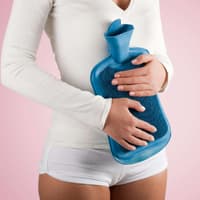- How does cystitis develop?
- When the body's own protection fails
- What helps with cystitis?
- When do I need an antibiotic for cystitis?
- How do I prevent a bladder infection?
It is the number one common female disease: cystitis. But what helps with cystitis? It's high season again, especially in winter. This is because hypothermia and cold feet favor the bacterial infection. In addition, we feel thirsty less often and drink less. Ideal conditions for bacteria to multiply in the bladder. Here we try to answer the question of what helps with cystitis once and for all and give you the best prevention and SOS tips.
How does a bladder infection develop?
Fungi or viruses rarely cause the infection. In around 80 percent of cases, coliform bacteria are responsible. In most cases, these bacteria also come from our own intestines, where they are a natural part of the intestinal flora. Sometimes they enter the bladder through the short urethra and attach themselves there.
When the body's own protection fails
Normally, the female body protects itself quite well against these bacteria. This is because the acidic vaginal flora kills the pathogens. But if the vaginal flora is disturbed by excessive hygiene, insufficient fluid intake, medication, an altered hormone balance or a generally weakened immune system, the bacteria have an easy time of it. And this is where a vicious circle begins. The body's first defensive reaction: it produces more urine to get rid of the germs. That's why you have to go to the toilet so often. Unfortunately, the inflammation causes the bladder and urethra to cramp at the same time - there is little or no urine. This causes the typical cramp-like pain in the lower abdomen. This is why those affected delay going as long as possible - but this allows the bacteria to multiply.
What helps with cystitis?
Tip 1: Keep your kidneys warm
Put on thick clothes. This is because cold reduces blood flow to the kidney and bladder mucosa, making it easier for bacteria to penetrate.
Warmth also helps with an existing infection. Place a hay bag or hot water bottle on your stomach. It feels good and relieves the pain.
Tip 2: Drink a lot
If the bladder is flushed regularly, germs are less able to adhere to the bladder mucosa and multiply. It is therefore not only important to drink plenty of fluids when you have an infection, but also as a preventative measure.
Mineral water, herbal teas and juice spritzers are best for acute urinary tract inflammation. It is better to avoid coffee and alcohol. This is because they irritate the bladder.
Tip 3: Eat cranberries
They are known for their protective effect. Their ingredients prevent bacteria from adhering to the bladder wall.
High doses of cranberry extract combined with pomegranate, vitamins and trace elements (e.g. Doppelherz Cranberry + Pomegranate) are particularly effective.
Tip 4: Pay attention to hygiene
Always wipe from front to back after urinating or defecating. This prevents intestinal bacteria from entering the urethra.
By the way: Sex can also increase the risk of infection. To protect yourself, go to the toilet afterwards and urinate straight away. Germs can then not colonize as quickly.
When do I need an antibiotic for cystitis?
If the inflammation has not subsided after two days, there is blood in the urine, fever or pain in the back area, consult a doctor. Then you almost certainly need a bladder infection remedy. In this condition, you should leave it to the doctor to treat the bladder infection. Today, antibiotics are only prescribed for cystitis in severe cases, because the healing power of plants works just as well. Hauhechel, goldenrod and orthosiphon alleviate the unpleasant symptoms and quickly flush the pathogens out of the bladder.
This is because the germs can reach the kidneys via the ureters and cause inflammation of the renal pelvis. Therefore: do not self-treat if the bladder infection is too acute.
How can I prevent a bladder infection?
Recurrent bladder infections can also be prevented. Drinking plenty of fluids, avoiding excessive intimate hygiene, warmth and sitz baths with camomile extract strengthen the vaginal flora and help to keep you healthy.









